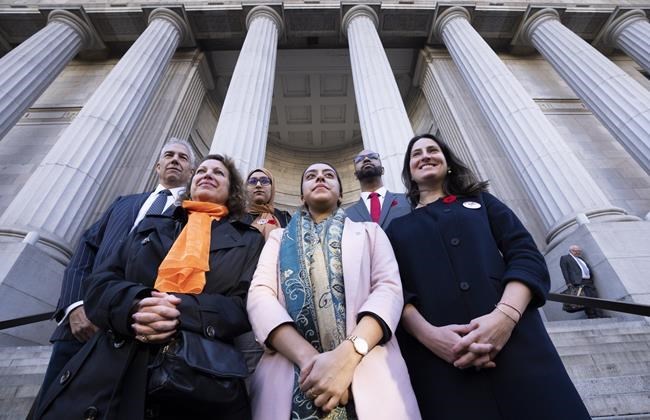MONTREAL — Quebec’s religious symbols ban violates a constitutional gender equality guarantee that can’t be overridden with the notwithstanding clause, lawyers for groups who oppose the law argued before the Court of Appeal Tuesday.
The lawyers argue the law disproportionately affects women and that while it pre-emptively invokes the notwithstanding clause — which can be used to override equality provisions in the Canadian Charter of Rights and Freedoms — the clause does not override another provision that states the rights and freedoms referred to in the Charter are “guaranteed equally to male and female persons.”
Perri Ravon, who represents the English Montreal School Board, said the law known as Bill 21 “disproportionately disadvantages Muslim women in the exercise of their religious liberty.”
She cited access to information requests sent to more than 300 public institutions in the province that showed the only people who have lost their jobs or not been hired as a result of the law are Muslim women who wear the hijab.¬Ý
The law bans government employees deemed to be in positions of authority — including teachers, police officers and judges — from wearing religious symbols while they are on the job.
Ravon said that in theory the law applies to everyone equally, but in practice it only affects Muslim women.¬Ý
"Who is losing their job as a result of Bill 21? Whose religious symbols are attracting negative attention? What symbol are people asking human resources directors about? The hijab every time," she told the court.
Ravon said lawmakers deliberately chose not to make the gender equality guarantee — known as Section 28 — subject to the notwithstanding clause to ensure the rights of women would be protected.
Véronique Roy, who represents the Fédération des femmes du Québec, a feminist organization, told the court that the Nova Scotia Court of Appeal has ruled that Section 28 is there to ensure any discrimination on the basis of sex allowed by the Charter’s equality rights provision is rendered unconstitutional.
But Am√©lie Pelletier-Desrosiers, who represents the province's attorney general, argued that Section 28 cannot on its own serve to strike down laws.¬Ý
"The position of the attorney general is that it is not possible to circumvent the notwithstanding clause by using Section 28 to reinstate rights and freedoms that are being overridden," she said.
The notwithstanding clause explicitly allows the overriding of equality provisions, she said, arguing that the opponents of the law failed to provide statistical evidence to support their argument that the law specifically discriminates against women. Women make up 88 per cent of elementary school teachers and 65 per cent of secondary school teachers, so it is no surprise that they are more affected, she said.¬Ý
In April 2021, a Quebec Superior Court judge found that the gender equality guarantee could not be used on its own to invalidate laws as he upheld the bulk of Bill 21.
Christiane Pelchat, a lawyer for Pour les droits des femmes du Québec, a pro-secularism feminist group, argued that the law reinforces the equality between men and women.
"The law is not discriminatory. It's the religions that are discriminatory," she told the three-judge panel. "Religions, including the Muslim religion and even the Catholic religion and Jewish religion, are based on the patriarchy, so they are themselves sexist."
She argued that the law is not sexist because both men and women are prohibited from wearing religious symbols.¬Ý
This report by The Canadian Press was first published Nov. 8, 2022.
Pierre Saint-Arnaud, The Canadian Press




